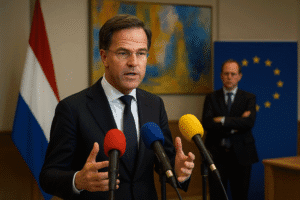How a Foreign Policy Crisis is Testing the Limits of Dutch Power
The Netherlands’ caretaker government is facing a severe crisis over its Israel-Gaza policy, culminating in the resignation of Foreign Minister Caspar Veldkamp. His departure, driven by an inability to secure support for tougher measures against Israel, triggered his party’s exit from the fragile coalition. This rupture exposes the profound difficulty of navigating foreign policy during domestic political instability, as the government operates with a weakened mandate.
The conflict forces a painful choice between upholding human rights principles and maintaining strategic partnerships. While Parliament rejected extreme measures like an arms embargo, it finds consensus on condemning Hamas and advocating for humanitarian access. Ultimately, the crisis highlights how a distant war can destabilize a nation’s politics, testing its moral compass and its capacity for coherent action on the world stage.

How a Foreign Policy Crisis is Testing the Limits of Dutch Power
In the world of international diplomacy, the Netherlands is often seen as a steady hand: a founding EU member, a committed transatlantic partner, and a nation that prides itself on a principled foreign policy. But the war in Gaza has shattered that calm exterior, exposing deep political fractures that are now threatening the stability of its own government.
The immediate casualty was Foreign Minister Caspar Veldkamp, who resigned last week after his push for a harder line against Israel was blocked by his cabinet colleagues. His departure, and the subsequent exit of his entire party from the already fragile caretaker government, is more than just a political shuffle. It’s a stark case study of how a distant conflict can bring domestic tensions to a boiling point, revealing the difficult choices middle-power nations face when principles clash with pragmatism.
A Resignation That Reveals a Deeper Divide
Veldkamp was no ordinary foreign minister. A former ambassador to Israel, he brought a nuanced understanding of the region to the role. His resignation wasn’t a sudden outburst but the culmination of months of internal frustration. He argued that the humanitarian catastrophe in Gaza—now officially declared a famine in Gaza City by UN experts—demanded more than diplomatic statements.
His proposed measures, including economic pressure and a review of the EU’s trade agreement with Israel, were consistently met with what his deputy called “applied brakes.” For Veldkamp, the breaking point was the realization that he could no longer credibly represent a government policy he believed was increasingly out of step with both the severity of the crisis and Dutch public opinion.
The Impossible Position of a Caretaker Government
The crisis highlights the inherent vulnerability of a caretaker administration. Since the government collapsed in June over a separate dispute on migration policy, it has been operating on borrowed time with a dramatically weakened mandate. With elections not until late October and a new coalition likely months away, the cabinet is effectively trying to steer a ship through a storm without a full crew.
This political limbo makes decisive action nearly impossible. On one side, there is immense pressure from segments of the public and opposition parties who accuse the government of complicity through inaction. On the other, there are serious practical concerns, such as the Defence Minister’s warning that an immediate ban on Israeli weapon components would hamper Dutch military readiness.
The government is caught between its moral compass and its operational realities, trying to balance a desire to uphold international law with the need to maintain strategic partnerships and national security.
Beyond the Headlines: What the Dutch Debate Is Really About
The parliamentary debate that followed Veldkamp’s resignation was telling. While dramatic proposals like a full arms embargo or unilateral recognition of Palestine were rejected, a subtler consensus emerged.
- A Hard Line on Hamas: There is broad agreement on the need for the “total destruction” of Hamas, showing that Dutch policy is not one-sided but seeks to address the security concerns that sparked the conflict.
- A Stand for Principles: Smaller, symbolic steps have already been taken. Barring far-right Israeli ministers from entering the Netherlands and excluding Israeli defence firms from a major arms exhibition signal a willingness to take a stand, even if largely symbolic.
- The Preference for a European Solution: The most common refrain in The Hague is the need for a unified EU approach. This isn’t just passing the buck; it’s a recognition that a small country like the Netherlands has limited influence alone but can be a powerful actor within a collective European strategy. Pushing for EU-wide sanctions and a review of agreements is where Dutch diplomacy is now focused.
The Human Cost and the Political Price
Ultimately, this political crisis is fueled by a human one. The images of famine and destruction from Gaza make abstract policy debates intensely urgent. For many Dutch lawmakers and citizens, the question is no longer about political strategy but about basic humanity and the responsibility of a nation that champions human rights.
The government’s internal paralysis, while understandable from a procedural standpoint, is seen by its critics as a failure of moral leadership at a critical historical moment.
As the Netherlands stumbles toward an election, its experience serves as a lesson for other democracies. It shows how external conflicts can amplify internal divisions and how caretaker governments struggle with proactive foreign policy. Most importantly, it underscores the eternal challenge of translating deeply held principles into actionable policy in a complex and unforgiving world. The Dutch aren’t just debating Israel and Palestine; they are debating their own identity on the global stage.
You must be logged in to post a comment.